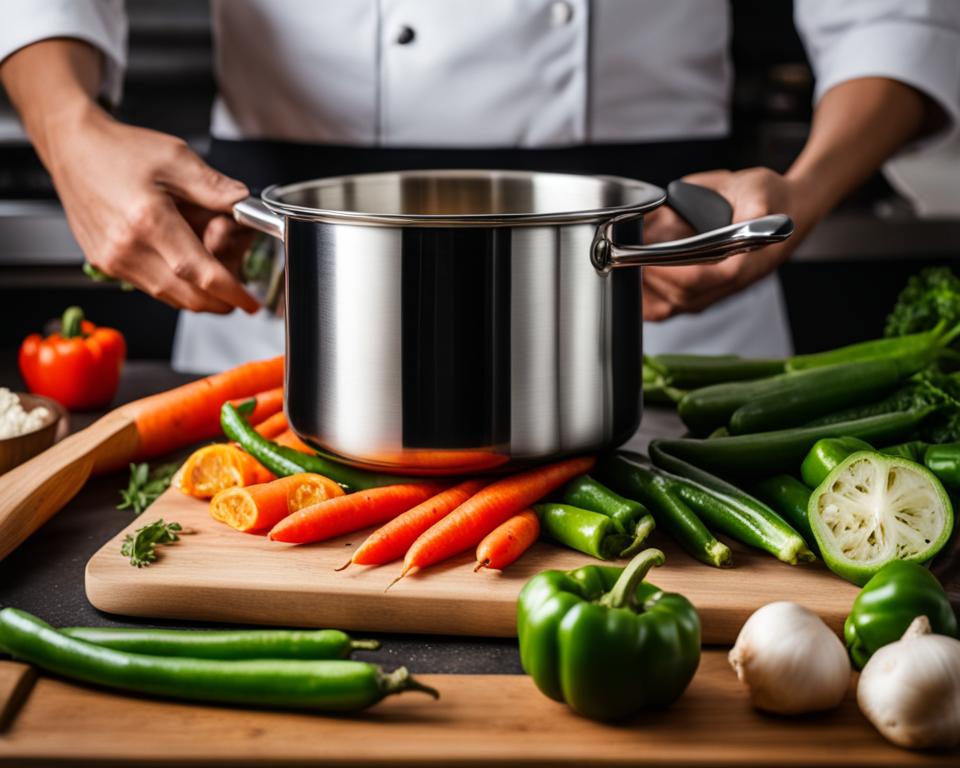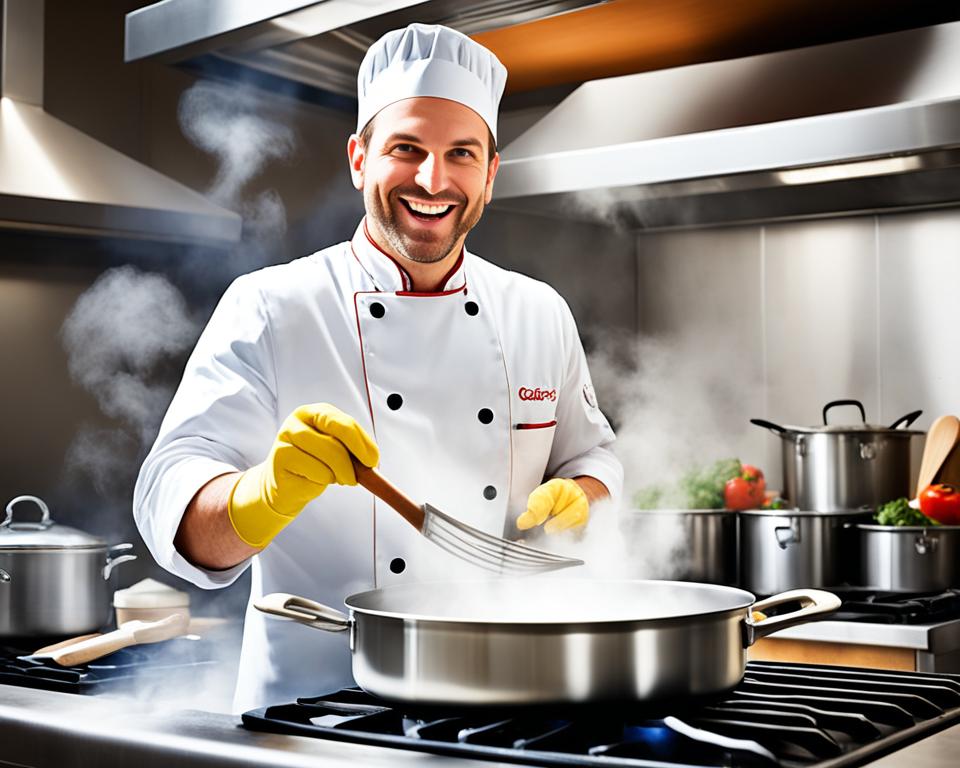How to Clean Cookware
Cookware is an essential part of any kitchen, but it can also be one of the most difficult to clean. Here are some tips on how to clean your cookware effectively and keep it looking its best:
- Wash cookware immediately after use. This will help to prevent food from sticking and burning, and it will make cleaning easier.
- Use a mild detergent and warm water. Harsh chemicals can damage cookware, so it’s best to use a mild detergent and warm water.
- Avoid using abrasive scrubbers. Abrasive scrubbers can scratch the surface of your cookware, so it’s best to use a soft cloth or sponge.
- Rinse cookware thoroughly after washing. Be sure to rinse all of the soap residue off of the cookware, as soap residue can leave a film on the surface of the cookware.
- Dry cookware thoroughly after washing. Wet cookware can rust, so it’s important to dry it thoroughly after washing.
By following these tips, you can keep your cookware clean and looking its best.
II. Benefits of using clean cookware
There are many benefits to using clean cookware, including:
- Reduced risk of foodborne illness
- Improved taste of food
- Increased lifespan of cookware
- Prevention of cross-contamination
By keeping your cookware clean, you can help to ensure that your food is safe to eat, that it tastes good, and that your cookware lasts longer.
III. How to clean cookware
There are a few different ways to clean cookware, depending on the type of cookware you have and the type of stain you are trying to remove.
Here are some general tips for cleaning cookware:
- Always wash cookware before using it for the first time.
- Rinse cookware thoroughly after each use.
- Use a mild detergent to clean cookware.
- Avoid using harsh chemicals or abrasive cleaners on cookware.
- Do not use metal scouring pads on non-stick cookware.
For more specific cleaning instructions, refer to the manufacturer’s instructions.
Different types of cookware
There are many different types of cookware available on the market, each with its own unique set of features and benefits. Some of the most common types of cookware include:
- Stainless steel cookware
- Aluminum cookware
- Cast iron cookware
- Copper cookware
- Nonstick cookware
Each type of cookware has its own advantages and disadvantages, so it is important to choose the type that is best suited for your needs.
For example, stainless steel cookware is durable and easy to clean, but it can be more expensive than other types of cookware. Aluminum cookware is lightweight and conducts heat evenly, but it can be more prone to scratches and corrosion. Cast iron cookware is durable and versatile, but it requires more care and maintenance than other types of cookware. Copper cookware is beautiful and conducts heat very well, but it is also more expensive and requires special care. Nonstick cookware is easy to clean and non-stick, but it can be more expensive and can release harmful chemicals when heated.
When choosing cookware, it is important to consider the following factors:
- Your budget
- Your cooking needs
- Your lifestyle
By considering these factors, you can choose the type of cookware that is best suited for you.
How to choose the right cookware
When choosing cookware, there are a few factors to consider, including:
- The type of cooking you will be doing
- The material of the cookware
- The size and shape of the cookware
- The budget
Here is a more detailed look at each of these factors:
**Type of cooking:** If you plan on doing a lot of searing, sautéing, or frying, you will need cookware that can withstand high heat. Cast iron, stainless steel, and carbon steel are all good options for these types of cooking. If you plan on doing more delicate cooking, such as steaming or poaching, you will need cookware that is more heat-sensitive. Copper, aluminum, and nonstick cookware are all good options for these types of cooking.
**Material of the cookware:** The material of the cookware will affect its heat conductivity, durability, and maintenance requirements. Cast iron is a very durable material that heats evenly and retains heat well. However, it can be difficult to clean and is prone to rust. Stainless steel is a more versatile material that is easier to clean than cast iron. However, it is not as heat conductive as cast iron and can be more expensive. Carbon steel is a good option for people who want the durability of cast iron without the hassle of rust. It is also more heat conductive than stainless steel. Copper is a very heat conductive material that heats up quickly and evenly. However, it is also more expensive and requires more care than other materials. Aluminum is a lightweight and inexpensive material that heats up quickly. However, it is not as durable as other materials and can be prone to warping. Nonstick cookware is a good option for people who want cookware that is easy to clean. However, it is not as durable as other materials and can be more expensive.
**Size and shape of the cookware:** The size and shape of the cookware will depend on the types of dishes you plan on cooking. For example, if you plan on making a lot of soups and stews, you will need a large pot with a wide mouth. If you plan on making a lot of stir-fries, you will need a wok. If you plan on making a lot of individual dishes, you will need a variety of smaller saucepans and skillets.
**Budget:** The budget you have available will also affect your choices when it comes to cookware. If you are on a tight budget, you may want to consider choosing cookware made from less expensive materials, such as aluminum or nonstick. If you are willing to spend more money, you may want to consider choosing cookware made from more durable materials, such as cast iron or stainless steel.
Once you have considered all of these factors, you should be able to choose the right cookware for your needs.
VI. How to care for your cookware
Once you have cleaned your cookware, it is important to care for it properly to prevent future damage. Here are a few tips:
- Always wash your cookware in warm, soapy water and dry it thoroughly with a soft cloth.
- Do not use abrasive cleaning pads or scouring powders on your cookware, as these can damage the surface.
- Do not use metal utensils on non-stick cookware, as these can scratch the surface.
- Do not put your cookware in the dishwasher, as this can damage the finish.
- Store your cookware in a dry, well-ventilated area.
By following these tips, you can help to extend the life of your cookware and keep it looking its best.
VII. Common mistakes people make when cleaning cookware
There are a few common mistakes that people make when cleaning cookware. These mistakes can lead to damage to the cookware, or to the food that is cooked in it.
Here are some of the most common mistakes:
- Using harsh chemicals or abrasive cleaners. This can damage the surface of the cookware, and can also leave behind harmful chemicals that can leach into your food.
- Not cleaning the cookware properly. This can leave behind food residue and bacteria, which can lead to health problems.
- Using the wrong type of brush or sponge. This can scratch the surface of the cookware, and can also damage the non-stick coating.
- Not drying the cookware properly. This can lead to rust and other damage.
To avoid these mistakes, it is important to follow the manufacturer’s instructions for cleaning your cookware. You should also use gentle cleaners and soft brushes or sponges. Be sure to rinse the cookware thoroughly after cleaning, and dry it immediately.
By avoiding these common mistakes, you can keep your cookware clean and healthy, and you can also ensure that your food is safe to eat.How to clean stubborn stains from cookware
How to clean stubborn stains from cookware
Stubborn stains can be a challenge to remove from cookware, but there are a few methods that can help.
One method is to soak the cookware in a solution of hot water and vinegar. The vinegar will help to break down the stain, and the hot water will help to loosen it.
Another method is to use a paste made of baking soda and water. The baking soda will act as a mild abrasive, and the water will help to dissolve the stain.
If the stain is still stubborn, you can try using a commercial cookware cleaner. Be sure to follow the directions on the product label.
Here are some tips for preventing stubborn stains from forming in the first place:
- Wash your cookware immediately after using it.
- Use a mild detergent and warm water.
- Avoid using harsh chemicals or abrasive cleaners.
- Rinse your cookware thoroughly after washing it.
By following these tips, you can help to keep your cookware clean and free of stubborn stains.
Tips for keeping your cookware looking new
Here are a few tips for keeping your cookware looking new:
- Wash your cookware immediately after each use.
- Use a mild detergent and warm water.
- Avoid using harsh abrasives or scouring pads, as these can damage the cookware.
- If your cookware is stainless steel, avoid using vinegar or lemon juice, as these can cause the metal to discolor.
- If your cookware is nonstick, avoid using metal utensils, as these can scratch the surface.
- Store your cookware in a dry place.
By following these tips, you can help to keep your cookware looking new for years to come.


